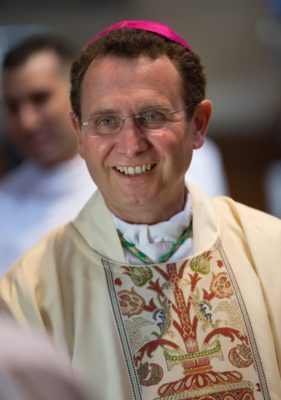November 25, 2020
Study leads to benchmarks for sexual misconduct policies at seminaries
NATIONAL
By William Cone, Catholic News Service

The chapel at St. Joseph’s Seminary in Yonkers, N.Y., is seen during the ordination of transitional deacons Nov. 7, 2020. (CNS photo/Gregory A. Shemitz)
Policy benchmarks developed from a study of sexual harassment and misconduct at seminaries and religious houses of formation in the United States are being promoted as a way to stem the abuses that came to light recently about former cardinal Theodore McCarrick.
The study was conducted in spring 2019 by the McGrath Institute for Church Life at the University of Notre Dame in South Bend, Indiana, and the Center for Applied Research in the Apostolate at Georgetown University in Washington.
Seminarians were surveyed anonymously about incidents of sexual misconduct at their schools of formation. The study found that, even though sexual misconduct is uncommon, there is low awareness among students of protocols for reporting such infractions.
Following the study’s completion, a group of bishops, seminary rectors, faculty and lay consultants was formed to develop proactive policy guidelines. The policy benchmarks came from that McGrath Seminary Study Group.
“All of these people are very well respected in the field of seminary education and are regarded as reformers, I would say,” said John Cavadini, Notre Dame theology professor and director of the McGrath Institute for Church Life, who convened the study group earlier this year. Two of the group members are presidents of national associations of seminary rectors.
The five benchmarks designed to improve seminary experiences are: systematic training of seminarians, faculty and staff regarding harassment policies; internal and external reporting and investigation procedures; victim support; periodic assessment of internal policies; and consistency and portability of standards to suit local conditions.

John Cavadini, director of the McGrath Institute for Church Life at the University of Notre Dame in South Bend, Ind., is seen in this 2013 file photo. (CNS photo/Matt Cashore, University of Notre Dame)
Similar studies had been done before, but not on all-male seminaries, Cavadini said.
The institute set the bar much lower than previous studies on what constitutes sexual harassment, he said, ranging from whether men had been pressured into conversation about dirty jokes or looking at pornography, all the way to pressuring someone for sex.
“We did the study not just to have a study but to see what other contributions we could make,” Cavadini said.
“Where the study showed there was the most significant need was in the area of reporting — policies regarding reporting of sexual harassment and the need for education about what sexual harassment was and about the seminaries’ policies,” he said.
Cavadini said the study group’s initial goal was to establish universal standards that all U.S. seminaries and houses of formation would follow. But that failed to take into account the diversity of conditions at each seminary. So, they settled on calling them “benchmarks.”
“We thought that benchmarks were something to aim for, something to commit to, and something that could be specific enough so that the essentials were part of what you’d commit to, that they were adaptable,” said Cavadini, who was interviewed by telephone Nov. 18 while recovering at home from COVID-19.
It was hoped that, if seminaries adopted the benchmarks and truly reformed seminary culture, they could regain credibility among the lay faithful that may have been affected by the 2018 Pennsylvania grand jury report and the Vatican’s recent McCarrick report, he told Catholic News Service.
“I remember feeling at the time (in 2018), it just felt so awful to receive all of these revelations,” Cavadini said. “I remember it was around the time of the feast of the Assumption. I remember going to Mass and I felt so sad and just sick in my stomach.
“Then I started thinking, ‘But why am I here?’ I’m here because this very same church for centuries and centuries proclaimed this faith, and I’m a beneficiary of it,” he said.
Cavadini said the pandemic complicated the study group’s work at first, but they were able to begin meeting online in May. He’s hoping that the benchmarks are obvious necessary reforms that will be adopted as seminary officials learn about them.
“Our group has not disbanded. Our group is going to meet to mobilize ourselves in terms of a movement of persuasion and of securing buy-in,” he said.

Auxiliary Bishop Andrew H. Cozzens of St. Paul and Minneapolis talks with seminarians before their ordination Mass at the Cathedral of St. Paul May 30, 2020. (CNS photo/Dave Hrbacek, The Catholic Spirit)
“We’d like the buy-in to be public. That is, we’ll have a website where seminaries will sign on publicly, and eventually people will see that it doesn’t look so great to have your name not on the list,” Cavadini added.
Msgr. Todd Lajiness, president of the National Association of Catholic Theological Schools and rector of Sacred Heart Major Seminary in Detroit, said he is comfortable with the benchmarks.
“They resonate well as being good, reasonable — a direction,” he said. “If we don’t already have a benchmark like that, then most seminaries would be looking to develop it. So, I think they’re very consistent and very helpful.”
Another McGrath Seminary Study Group member, Auxiliary Bishop Andrew H. Cozzens of St. Paul and Minneapolis, helped develop the seminary study. He also is president of the Seminary Formation Council, which helps train seminary formators and rectors.
“Thankfully, the study did confirm what we believed, which was that fundamentally seminaries are safe places,” Bishop Cozzens told CNS. “It also led to a discussion among many seminary rectors about what we could do to ensure that that is the case.”
Perhaps even more important than any benchmarks or policies to safeguard seminary life, he said, is the cultural change that needs to occur in the church.
“That culture which looks to protect other clerics based on some kind of false code of honor can’t be tolerated either in the seminary or in the priesthood, and certainly not in the episcopacy,” Bishop Cozzens said.
The seminary benchmarks are a necessary step toward that cultural change, he said. But it’s not just a good sign that these benchmarks exist.
“It’s the fact that their existence is also speaking to seminarians about the kind of culture that we need to have among priests and bishops,” Bishop Cozzens said, “which is a culture that provides opportunities for accountability, and for people who are in bad situations to get help, and for victimizers to be held accountable.”
(Editor’s Note: The study’s full report can be viewed at https://news.nd.edu/assets/335261/micl_cara_report_1_.pdf. For more information on the McGrath Institute for Church Life, go to https://mcgrath.nd.edu.)


 Facebook
Facebook Youtube
Youtube
